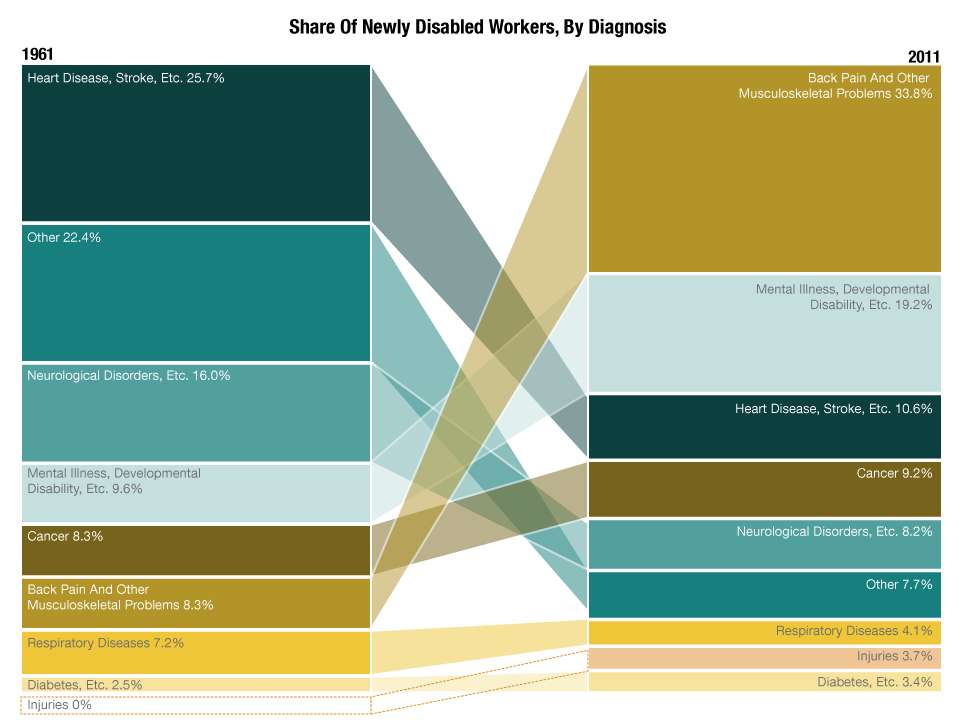
Posted on 03/24/2013 8:11:51 AM PDT by Theoria
The startling rise of disability in America
In the past three decades, the number of Americans who are on disability has skyrocketed. The rise has come even as medical advances have allowed many more people to remain on the job, and new laws have banned workplace discrimination against the disabled. Every month, 14 million people now get a disability check from the government.
The federal government spends more money each year on cash payments for disabled former workers than it spends on food stamps and welfare combined. Yet people relying on disability payments are often overlooked in discussions of the social safety net. People on federal disability do not work. Yet because they are not technically part of the labor force, they are not counted among the unemployed.
In other words, people on disability don't show up in any of the places we usually look to see how the economy is doing. But the story of these programs -- who goes on them, and why, and what happens after that -- is, to a large extent, the story of the U.S. economy. It's the story not only of an aging workforce, but also of a hidden, increasingly expensive safety net.
For the past six months, I've been reporting on the growth of federal disability programs. I've been trying to understand what disability means for American workers, and, more broadly, what it means for poor people in America nearly 20 years after we ended welfare as we knew it. Here's what I found.
One In Four
Hale County, Alabama
In Hale County, Alabama, 1 in 4 working-age adults is on disability. On the day government checks come in every month, banks stay open late, Main Street fills up with cars, and anybody looking to unload an old TV or armchair has a yard sale.
Sonny Ryan, a retired judge in town, didn't hear disability cases in his courtroom. But the subject came up often. He described one exchange he had with a man who was on disability but looked healthy.
"Just out of curiosity, what is your disability?" the judge asked from the bench. "I have high blood pressure," the man said. "So do I," the judge said. "What else?" "I have diabetes." "So do I."
There's no diagnosis called disability. You don't go to the doctor and the doctor says, "We've run the tests and it looks like you have disability." It's squishy enough that you can end up with one person with high blood pressure who is labeled disabled and another who is not.
I talked to lots of people in Hale County who were on disability. Sometimes, the disability seemed unambiguous.
"I was in a 1990 Jeep Cherokee Laredo," Dane Mitchell, a 23-year-old guy I met in a coffee shop, told me. "I flipped it both ways, flew 165 feet from the Jeep, going through 12 to 14,000 volts of electrical lines. Then I landed into a briar patch. I broke all five of my right toes, my right hip, seven of my vertebrae, shattering one, breaking a right rib, punctured my lung, and then I cracked my neck."
Other stories seemed less clear. I sat with lots of women in Hale County who told me how their backs kept them up at night and made it hard for them to stand on the job. "I used to cry to try to work," one woman told me. "It was so painful."
People don't seem to be faking this pain, but it gets confusing. I have back pain. My editor has a herniated disc, and he works harder than anyone I know. There must be millions of people with asthma and diabetes who go to work every day. Who gets to decide whether, say, back pain makes someone disabled?
As far as the federal government is concerned, you're disabled if you have a medical condition that makes it impossible to work. In practice, it's a judgment call made in doctors' offices and courtrooms around the country. The health problems where there is most latitude for judgment -- back pain, mental illness -- are among the fastest growing causes of disability.

In Hale County, there was one guy whose name was mentioned in almost every story about becoming disabled: Dr. Perry Timberlake. I began to wonder if he was the reason so many people in Hale County are on disability. Maybe he was running some sort of disability scam, referring tons of people into the program.
After sitting in the waiting room of his clinic several mornings in a row, I met Dr. Timberlake. It turns out, there is nothing shifty about him. He is a doctor in a very poor place where pretty much every person who comes into his office tells him they are in pain.
"We talk about the pain and what it’s like," he says. "I always ask them, 'What grade did you finish?'"
What grade did you finish, of course, is not really a medical question. But Dr. Timberlake believes he needs this information in disability cases because people who have only a high school education aren't going to be able to get a sit-down job.
Dr. Timberlake is making a judgment call that if you have a particular back problem and a college degree, you're not disabled. Without the degree, you are.
Over and over again, I'd listen to someone's story of how back pain meant they could no longer work, or how a shoulder injury had put them out of a job. Then I would ask: What about a job where you don't have to lift things, or a job where you don't have to use your shoulder, or a job where you can sit down? They would look at me as if I were asking, "How come you didn't consider becoming an astronaut?"
One woman I met, Ethel Thomas, is on disability for back pain after working many years at the fish plant, and then as a nurse's aide. When I asked her what job she would have in her dream world, she told me she would be the woman at the Social Security office who weeds through disability applications. I figured she said this because she thought she'd be good at weeding out the cheaters. But that wasn't it. She said she wanted this job because it is the only job she's seen where you get to sit all day.
At first, I found this hard to believe. But then I started looking around town. There's the McDonald's, the fish plant, the truck repair shop. I went down a list of job openings -- Occupational Therapist, McDonald's, McDonald's, Truck Driver (heavy lifting), KFC, Registered Nurse, McDonald's.
I actually think it might be possible that Ethel could not conceive of a job that would accommodate her pain.
‘We're Just Hiding
Aberdeen, Washington
There's a story we hear all the time these days that doesn't, on its face, seem to have anything to do with disability: Local Mill Shuts Down. Or, maybe: Factory To Close.
Four years ago, when I was working as a reporter in Seattle, I did that story. I stood with workers in a dead mill in Aberdeen, Washington and memorialized the era when you could graduate from high school and get a job at a mill and live a good life. That was the end of the story.
But after I got interested in disability, I followed up with some of the guys to see what happened to them after the mill closed. One of them, Scott Birdsall, went to lots of meetings where he learned about retraining programs and educational opportunities. At one meeting, he says, a staff member pulled him aside.
"Scotty, I'm gonna be honest with you," the guy told him. "There's nobody gonna hire you … We're just hiding you guys." The staff member's advice to Scott was blunt: "Just suck all the benefits you can out of the system until everything is gone, and then you're on your own."
Scott, who was 56 years old at the time, says it was the most real thing anyone had said to him in a while.
There used to be a lot of jobs that you could do with just a high school degree, and that paid enough to be considered middle class. I knew, of course, that those have been disappearing for decades. What surprised me was what has been happening to many of the people who lost those jobs: They've been going on disability.
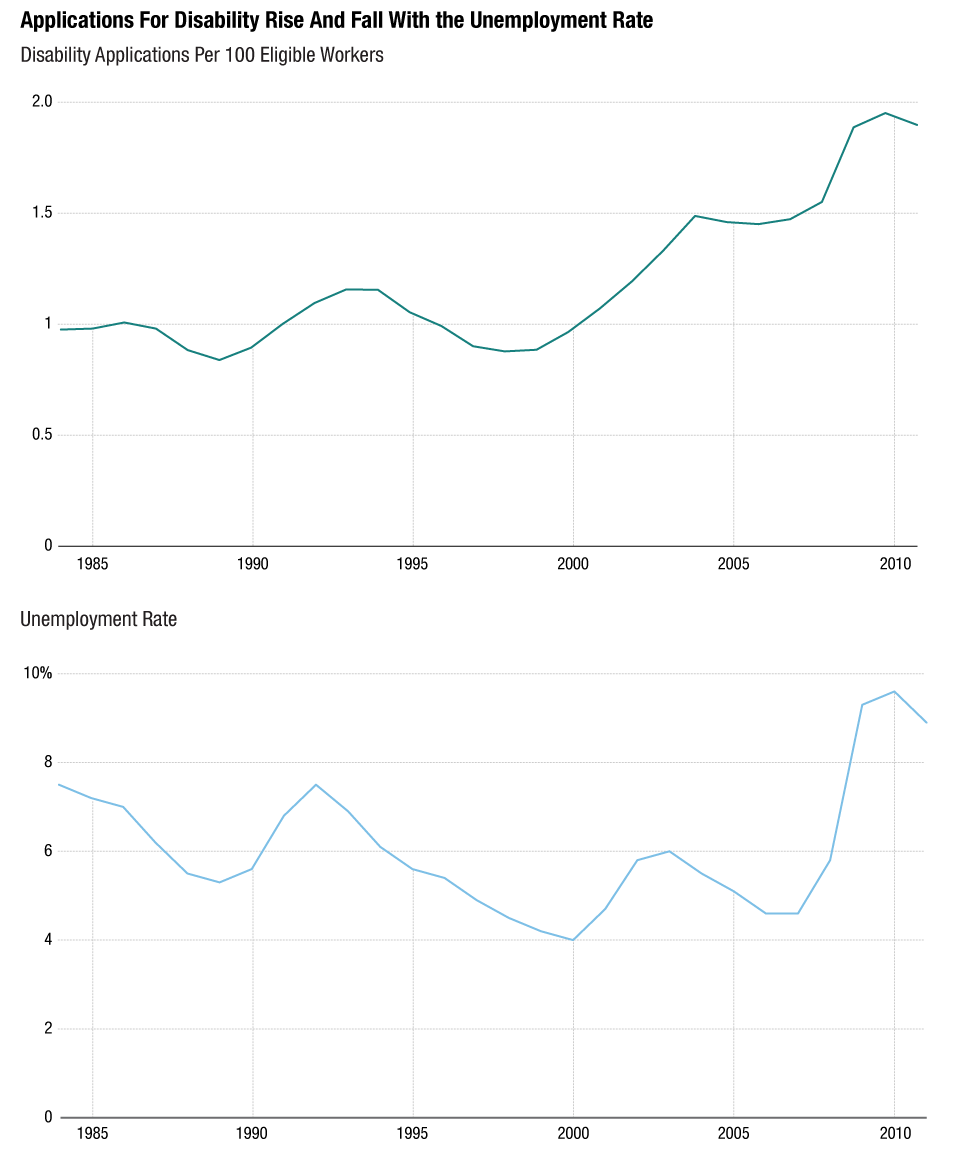
Scott tried school for a while, but hated it. So he took the advice of the rogue staffer who told him to suck all the benefits he could out of the system. He had a heart attack after the mill closed and figured, "Since I've had a bypass, maybe I can get on disability, and then I won't have worry to about this stuff anymore." It worked; Scott is now on disability.
Scott's dad had a heart attack and went back to work in the mill. If there'd been a mill for Scott to go back to work in, he says, he'd have done that too. But there wasn't a mill, so he went on disability. It wasn't just Scott. I talked to a bunch of mill guys who took this path -- one who shattered the bones in his ankle and leg, one with diabetes, another with a heart attack. When the mill shut down, they all went on disability.
I don't know what that rogue staffer meant when he told Scott Birdsall they were trying to hide those mill guys. But signing up for disability benefits is an excellent way to stay hidden in one key way: People on disability are not counted among the unemployed.
"That's a kind of ugly secret of the American labor market," David Autor, an economist at MIT, told me. "Part of the reason our unemployment rates have been low, until recently, is that a lot of people who would have trouble finding jobs are on a different program."
Part of the rise in the number of people on disability is simply driven by the fact that the workforce is getting older, and older people tend to have more health problems.
But disability has also become a de facto welfare program for people without a lot of education or job skills. But it wasn't supposed to serve this purpose; it's not a retraining program designed to get people back onto their feet. Once people go onto disability, they almost never go back to work. Fewer than 1 percent of those who were on the federal program for disabled workers at the beginning of 2011 have returned to the workforce since then, one economist told me.
People who leave the workforce and go on disability qualify for Medicare, the government health care program that also covers the elderly. They also get disability payments from the government of about $13,000 a year. This isn't great. But if your alternative is a minimum wage job that will pay you at most $15,000 a year, and probably does not include health insurance, disability may be a better option.
But going on disability means you will not work, you will not get a raise, you will not get whatever meaning people get from work. Going on disability means, assuming you rely only on those disability payments, you will be poor for the rest of your life. That's the deal. And it's a deal 14 million Americans have signed up for.
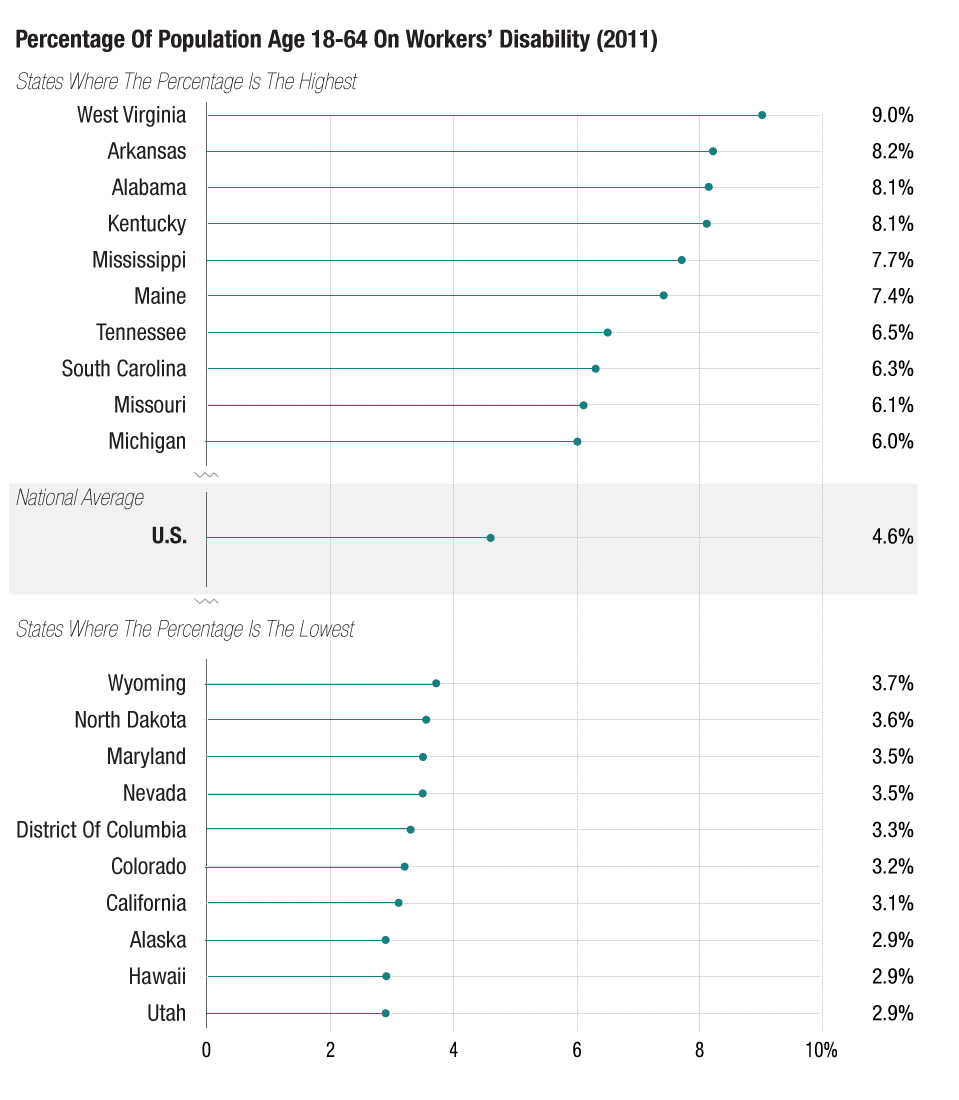
Kids
Jahleel Duroc is on disability
As I got further into this story, I started hearing about another group of people on disability: kids. People in Hale County told me that what you want is a kid who can "pull a check." Many people mentioned this, but I basically ignored it. It seemed like one of those things that maybe happened once or twice, got written up in the paper and became conversational fact among neighbors.
Then I looked at the numbers. I found that the number of kids on a program called Supplemental Security Income -- a program for children and adults who are both poor and disabled -- is almost seven times larger than it was 30 years ago.
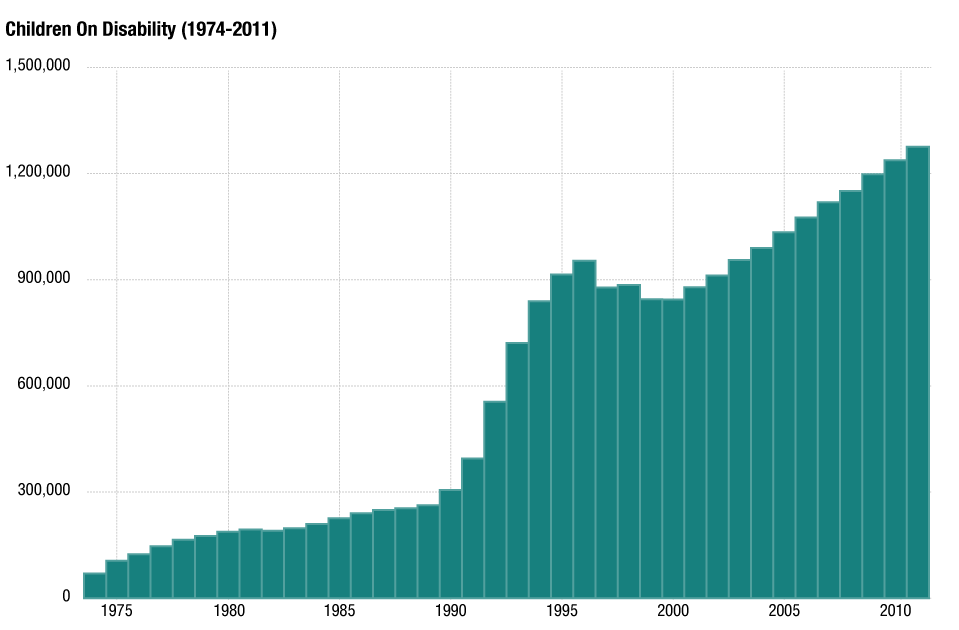
Jahleel Duroc (pictured above) is gap-toothed, 10 and vibrating with enthusiasm. He's excited to talk to someone new, excited to show me his map of his neighborhood in the Bronx. He's disabled in the eyes of the government because he has a learning disability.
"I like school," he told me. "My favorite periods are math and science and art, and lunch and recess and snack … social studies and writing are my favorite."
His favorite thing about school, in other words, is everything.
When you are an adult applying for disability you have to prove you cannot function in a "work-like setting." When you are a kid, a disability can be anything that prevents you from progressing in school. Two-thirds of all kids on the program today have been diagnosed with mental or intellectual problems.
Jahleel is a kid you can imagine doing very well for himself. He is delayed. But given the right circumstances and support, it's easy to believe that over the course of his schooling Jahleel could catch up.
Let's imagine that happens. Jahleel starts doing better in school, overcomes some of his disabilities. He doesn't need the disability program anymore. That would seem to be great for everyone, except for one thing: It would threaten his family's livelihood. Jahleel's family primarily survives off the monthly $700 check they get for his disability.
Jahleel's mom wants him to do well in school. That is absolutely clear. But her livelihood depends on Jahleel struggling in school. This tension only increases as kids get older. One mother told me her teenage son wanted to work, but she didn't want him to get a job because if he did, the family would lose its disability check.
I haven't taken a survey or anything, but I'm guessing a large majority of Americans would be in favor of some form of government support for disabled children living in poverty. We would have a hard time agreeing on exactly how we want to offer support, but I think there are some basic things we'd all agree on.
Kids should be encouraged to go to school. Kids should want to do well in school. Parents should want their kids to do well in school. Kids should be confident their parents can provide for them regardless of how they do in school. Kids should become more and more independent as they grow older and hopefully be able to support themselves at around age 18.
The disability program stands in opposition to every one of these aims.
The End Of Welfare As We Knew It
Bill Clinton signs welfare reform into law (1996).
A federal program for disabled people was first proposed in the 1930s. Even then, a Social Security actuary was worried. "You will have workers like those in the Dust Bowl area, people who have migrated to California and elsewhere, who perhaps have not worked in a year or two, who will imagine they are disabled," the actuary wrote. The cost of the program could be higher than "anything that can be forecast."
The actuary's warning gets at a central tension in a much bigger debate: What should we, as a country, do for people who aren't making it? Americans want to be generous. But Americans don't want to be chumps.
The first key pieces of the modern safety net were created in the 1930s, under Franklin Roosevelt. The first federal disability program was created in the '50s. A few years later, Lyndon Johnson pushed to expand the federal safety net further.
In the '80s, Ronald Reagan argued that a robust economy would do more to eliminate poverty than any federal program. When Reagan used the term "welfare queen," it was clear where he stood. He didn't want to be a chump.
Bill Clinton tried to appease both sides. He expanded many programs for the working poor, but he also promised to "end welfare as we know it" -- to nudge people off of public assistance, give them some job training, and force them to make it on their own. "A society rooted in responsibility must first promote the value of work, not welfare," Clinton said. History has judged Clinton's welfare reform a big success.
But when you include disability in the story of welfare reform, the picture looks more ambiguous.
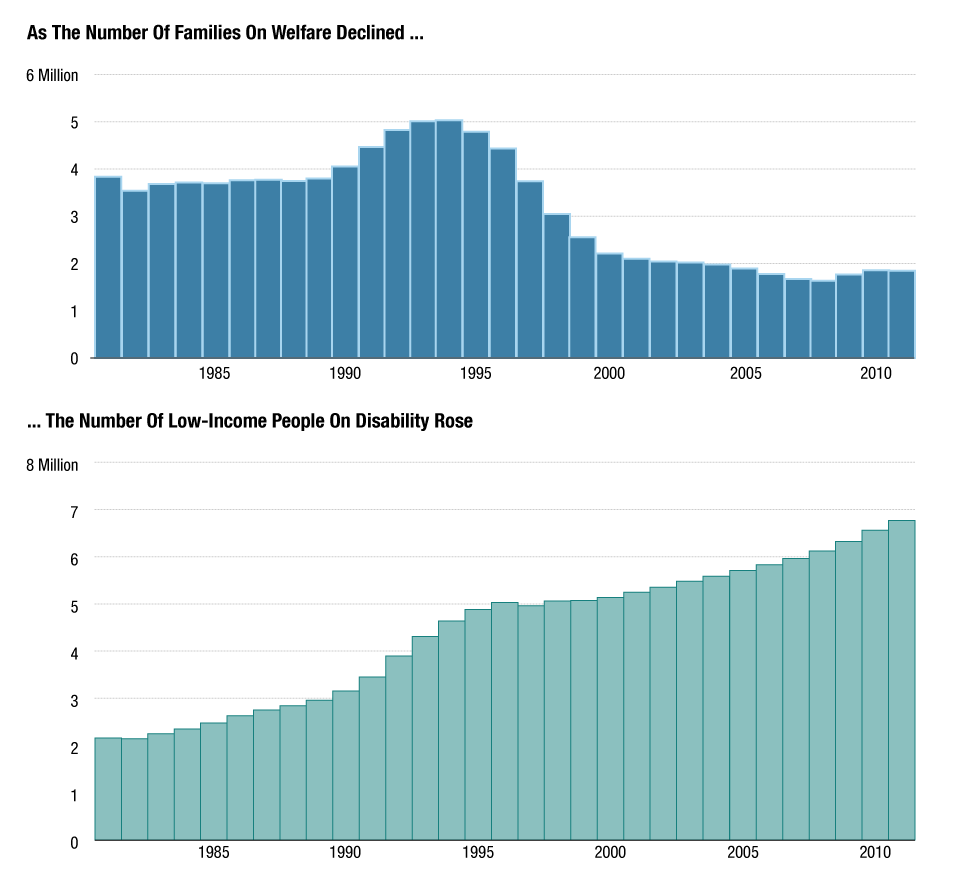
Part of Clinton's welfare reform plan pushed states to get people on welfare into jobs, partly by making states pay a much larger share of welfare costs. The incentive seemed to work; the welfare rolls shrank. But not everyone who left welfare went to work.
‘Can you think of anything else that’s been bothering you and disabling you and preventing you from working?’
A person on welfare costs a state money. That same resident on disability doesn't cost the state a cent, because the federal government covers the entire bill for people on disability. So states can save money by shifting people from welfare to disability. And the Public Consulting Group is glad to help.
PCG is a private company that states pay to comb their welfare rolls and move as many people as possible onto disability. "What we're offering is to work to identify those folks who have the highest likelihood of meeting disability criteria," Pat Coakley, who runs PCG's Social Security Advocacy Management team, told me.
The company has an office in eastern Washington state that's basically a call center, full of headsetted women in cubicles who make calls all day long to potentially disabled Americans, trying to help them discover and document their disabilities:
"The high blood pressure, how long have you been taking medications for that?" one PCG employee asked over the phone the day I visited the company. "Can you think of anything else that's been bothering you and disabling you and preventing you from working?"
The PCG agents help the potentially disabled fill out the Social Security disability application over the phone. And by help, I mean the agents actually do the filling out. When the potentially disabled don't have the right medical documentation to prove a disability, the agents at PCG help them get it. They call doctors' offices; they get records faxed. If the right medical records do not exist, PCG sets up doctors' appointments and calls applicants the day before to remind them of those appointments.
PCG also works very, very hard to make the people who work at the Social Security happy. Whenever the company wins a new contract, Coakley will personally introduce himself at the local Social Security Administration office, and see how he can make things as easy as possible for the administrators there.
"We go through even to the point, frankly, of do you like things to be stapled or paper-clipped?" he told me. "Paper clips wins out a lot of times because they need to make photocopies and they don't want to be taking staples out."
There's a reason PCG goes to all this trouble. The company gets paid by the state every time it moves someone off of welfare and onto disability. In recent contract negotiations with Missouri, PCG asked for $2,300 per person. For Missouri, that's a deal -- every time someone goes on disability, it means Missouri no longer has to send them cash payments every month. For the nation as a whole, it means one more person added to the disability rolls.
The Disability-Industrial Complex
Files at Binder and Binder, a law firm that handles some 30,000 disability cases each year.
In the past few decades, an entire disability-industrial complex has emerged. It has just one goal: Push more people onto disability. And, sometimes, it seems like the government is outmatched. This is especially true in the legal system.
Daytime TV in many places is full of ads from lawyers who promise to fight the government and win the disability benefits you deserve. There are tons of YouTube videos about getting disability -- one lawyer, one webcam. The standard form is a let's-get-real chat about how to win this thing.
There is one man who takes much of the credit for this industry: Charles Binder. "When we started," Binder told me, "I don't think anybody else was advertising." What's more, most people who applied for disability were denied and never had a hearing. Binder, and the lawyers who followed him, changed that. "I've created some of the problems for the government because so many people appeal," Binder says.
When he started in 1979, Binder represented fewer than 50 clients. Last year, his firm represented 30,000 people. Thirty thousand people who were denied disability appealed with the help of Charles Binder's firm. In one year. Last year, Binder and Binder made $68.7 million in fees for disability cases.
The way Binder tells it, he's is a guy helping desperate people get the support they deserve. He is a cowboy-hatted Lone Ranger going to court to fight the good fight for the everyman.
Who is making the case for the other side? Who is defending the government's decision to deny disability?
Nobody.
"You might imagine a courtroom where on one side there's the claimant and on the other side there's a government attorney who is saying, 'We need to protect the public interest and your client is not sufficiently deserving,'" the economist David Autor says. "Actually, it doesn't work like that. There is no government lawyer on the other side of the room."
The Social Security Administration says disability hearings were never meant to be adversarial. In these courtrooms, the judges are employees of Social Security. So the judges are supposed to both represent the government and make a fair and objective determination. But the judges themselves say this role can be difficult.
Judge Randy Frye, who hears disability cases in North Carolina, told me he often finds himself glancing to where he imagines there should be a chair for the government attorney, as there would be in a normal case. "There are always moments where you are concerned maybe you missed something," he says.
"You would turn to that chair and say, 'Counsel, I'm having trouble with this issue. Why does the government think this case should not be reversed?'"
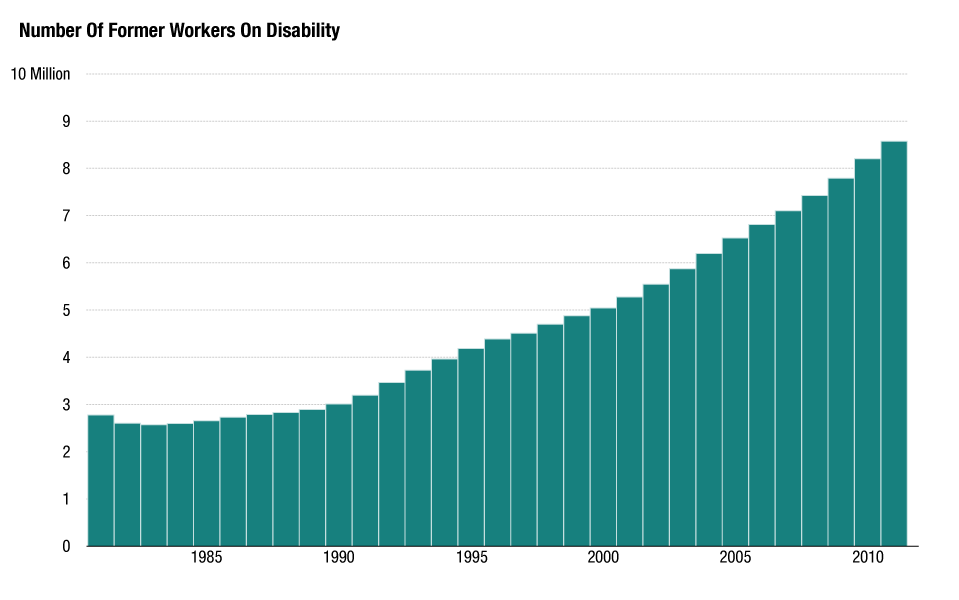
Somewhere around 30 years ago, the economy started changing in some fundamental ways. There are now millions of Americans who do not have the skills or education to make it in this country.
Politicians pay lip service to this problem during election cycles, but American leaders have not sat down and come up with a comprehensive plan.
In the meantime, federal disability programs became our extremely expensive default plan. The two big disability programs, including health care for disabled workers, cost some $260 billion a year.
People at the Social Security Administration, which runs the federal disability programs, say we cannot afford this. The reserves in the disability insurance program are on track to run out in 2016, Steve Goss, the chief actuary at Social Security, told me.
Goss is confident that Congress will act to keep disability payments flowing, probably by taking money from the Social Security retirement fund. Of course, the retirement fund itself is on track to run out of money by 2035.
Goss and his colleagues have worked out a temporary fix under which the retirement and disability funds will both run out of money by 2033. He says he hopes the country will have come up with a better plan by then.
Sure. All admins ‘buy’ votes in different ways. Some with govt checks, others with selective tax breaks.
Who are these a$$holes approving this crap?
And the author needs to spare us the BS about how if you don't have an edumacation you don't have any "options" other than to fake a disability.
I'd LOVE to have these parasites cut off tomorrow. Betcha that their "disabling" hypertension won't prevent them from working at Mickey-Ds.
yes, I have one in my family who claims to have chronic fatigue syndrome along with a degree from one of America’s “best” liberal private colleges, smokes pot and cigarettes like a dam chimney and collects a government check.
you are a liberal I can tell
Spare me the jibe.
This is a pretty good article describing what’s going on with disability. Thanks for posting it.
How much do they receive a month? Can they receive additional money for every child on disability? Can husband and wife both receive disability? Can you receive disability and food stamps? Can you receive disability, food stamps and any other benefits? Can you be a make believe pig farmer and receive disability? I think we have socialism, but it just hides in several programs instead of one.
I know a friend of mine who’s a lawyer and whose firm defends a lot of businesses in these types of cases. He is of the opinion that 90% of disability claims are fake. I have no way of knowing if that’s true or not, but this guy is a pretty straight shooter. And after retiring a short time ago after working 40 years with various types of people, I’ve met more than a few whose claims of inability to work due to physical limitations had me and a lot of other people frowning with doubt. And I worked with plenty of people with real physical limitations who worked full-time through the pain.
People who have paid in Medicare taxes for at least 40 quarters qualify for SSDI. Two years after qualifying they are eligible for Medicare,.
Children and those not eligible for S.S. (By not having enough quarters paid in) may qualify for SSI, a different program.
That's it, in a nutshell.
The residual wealth and declining incomes of the productive American middle class is being drained to:
(1) lift up and support every third-world $4!t-hole on the planet, and
(2) support the displaced American workers, along with those who never did and never will work, and
(3) enrich the liberal and RINO self-anointed elitists who are facilitating our destruction.
The big government parasites, the Democrats and the RINOs, have worked together to destroy the USA, all the while pretending to oppose each other.
I'm an Idaho resident working on a task that requires my physical presence in San Diego. The reward is that I have to pay CA state income taxes and carry the burden of a high cost of living and sales taxes, but I can't vote in CA elections.
That's going to change next Friday. A 90 day "funding gap" will make it necessary to vacate the rental room in San Diego and go home to Idaho. I'm going to make sure my state income tax is assessed based on where I'm sitting whether working or vacationing. I have endured 4 years living away from my home. Perhaps it is time to do something other than 55 to 70 hours a week for 40 hours pay.
only a lib thinks any taxes are “good”
OTOH, the Marxist idiots that dominate this State are wrecking the livelihoods of many of the States currently so heavily on the dole, primarily via "environmental" "laws." California is screwed up, it does carry an enormous welfare load of illegal aliens, but as a whole, the State is a net contributor of Federal revenue.
You get unemployed. You can't get re-employed, since the work-world has drastically shrunk since the Mombasa MF took office. So you get "disabled." Since no one is hiring you, you ARE "disabled." There is a lawyer, who has a doctor, who has a case worker who can prove that, and all get together to push the paper through.
You are an embarrassing statistic. So you are happy to be finessed out of official existence in the labor force. You get a Mexican to drive your truck and you both work for cash ... until the Mexican's lawyer figures out the scam.
Of course, everyone votes for Obama. It's money, right?
Lawyers advertise to ‘fight for your rights’ ... and they're NOT talking about 1st or 2nd amendment rights, but about ‘gettin’ yours’... The most common approach is ‘mental’ as it's hard to disprove...
Lawyers advertise to ‘fight for your rights’ ... and they're NOT talking about 1st or 2nd amendment rights, but about ‘gettin’ yours’... The most common approach is ‘mental’ as it's hard to disprove... Oh - and the ones who use uncontrollable anger as their disability will be recruited by Obama's National Army - or whatever he calls that horror.
“Rise in disability fraud is more like it. “
There is also disability fraud when leaving the military. There is the “percent” dance upon separation that is winked at in far too many instances - if you get a fractional disability declared, then that fraction of your retired pay is tax free.
When you offer people free money, don’t be surprised when they take it.
occassionally I'll see someone actually in a wheelchair, or wearing braces on both knees and using a walker or crutches...
but almost all those parking in disabled free parking areas walk and move just as well as I do....
okay, so I'll get slammed now because I'll be told that "you can't always see the disability".....BS!
if you're able to get out of your car and walk up the stairs to the casino and play all day, you are NOT disabled...
I refute the authors statement about how you'll be poor all your life if your on disability...
if you work some, get your house, and you get on disability, and then your spouse gets on it too, which means you don't pay any SS tax, and means you'll get Medicare, which means you might also get breaks on your property taxes, then you have got it made...especially if you other assets because disability is handed out no matter how many houses, sports cars, etc you have.....I know this personally...
the world is just full of insanity....some day, those of us holding it together are just going to explode....
look at your pay check lately...look also if you have to pay premiums for your spouse, or family or yourself....if you’re like most private industry employees, you are paying for ALL of them....ALL the time...
Disclaimer: Opinions posted on Free Republic are those of the individual posters and do not necessarily represent the opinion of Free Republic or its management. All materials posted herein are protected by copyright law and the exemption for fair use of copyrighted works.